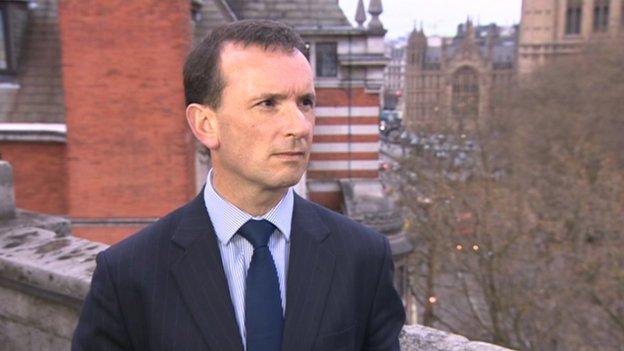Brexit powers pledge fails to pacify PM's Welsh critics
- Published
- comments

'I'm a bit disappointed in that' - Welsh Secretary Alun Cairns on criticism from First Minister Carwyn Jones
Theresa May's letter triggering Article 50 may have attempted a more conciliatory tone but it does not seem to have worked with the Welsh Government.
Although there is some common ground between the two governments on, for example, the need for free trade within the single market, Carwyn Jones has complained that he didn't see the letter before it was published on Wednesday. (He has that in common with most of Mrs May's cabinet).
The first minister told AMs: "I discussed the Article 50 letter in general terms with the prime minister when we met in Swansea last week.
"I should be clear, though, that I didn't see the letter before today and we were not invited to contribute to its drafting. This is unacceptable and is the culmination of a deeply frustrating process in which the devolved administrations have persistently been treated with a lack of respect.
"It is all the more regrettable given the UK government's stated aim was to develop a negotiating framework for the whole of the UK."
'Disappointed'
Mr Jones may have been playing to an audience, but Welsh Secretary Alun Cairns hit back: "I'm a bit disappointed in that. The prime minister has been in Wales three times in the last six weeks.
"We've been talking about the contents of this letter for many months.
"We've clearly all made our representations but, ultimately, the UK government needs to act in the interests of the whole of the UK and that's what we're doing, specifically with Wales being mentioned."
Mrs May did indeed mention Wales in the letter. She told Donald Tusk: "When it comes to the return of powers back to the United Kingdom, we will consult fully on which powers should reside in Westminster and which should be devolved to Scotland, Wales and Northern Ireland.
"But it is the expectation of the government that the outcome of this process will be a significant increase in the decision-making power of each devolved administration."
'Questions'
That sentence may have been written more with Scotland in mind, but it does prompt the question: which powers? Farming? Economic aid? And will the money follow the powers?
Alun Cairns wouldn't answer those questions, although Carwyn Jones has said he fears there won't be any money to accompany the powers after 2020. (Perhaps Mr Jones doesn't think Jeremy Corbyn will win power that year - Labour has pledged to maintain EU funding levels on regional aid beyond 2020).
Some in Whitehall think the way EU money has been spent in Wales - check out Nick Clegg's film from Ebbw Vale - is an argument for transferring those powers to Westminster, but that looks politically less likely now.
We may get some more details about the process in a white paper on the Great Repeal Bill on Thursday but, at the moment, the identity of the powers the UK government wants to see devolved is something of a mystery.